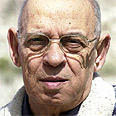
'Disturbing deterioration'. Michael.
Photo: Ronny Schitzer

'Stupidity'. Dr. Eyal Gross
Experts split on 'Nakba law'
Approval of motion to prohibit events marking Palestinian Arab 'catastrophe' of Israel's inception raises concerns among legal experts. Tel Aviv University law expert calls motion 'foolish', while Sha'arei Mishpat law professor says motion legitimate, 'people forget where we are living'
The motion approved by the Ministerial Committee on Legislation on Sunday to ban Nakba Day, that refers to the refugee flight of Palestinian Arabs following Israel's inception, has caused a storm among legal experts and intellectuals, who say human rights and the freedom of expression, that have been the guidelines to Israeli democracy, will suffer a difficult blow.
"To what level of stupidity can they sink?" wondered Dr. Eyal Gross, a constitutional law expert at Tel Aviv University, "it's the kind of law that tries to make everyone think the same way. I don't know of any similar laws in any democratic country."
Nakba vs. Independence
Sharon Roffe-Ofir
Youth group holds picnic in response to Arab march marking expulsion of Palestinians from land
According to the motion, that was brought before the committee by Knesset Member Alex Miller (Yisrael Beiteinu), anyone marking Nakba Day could receive up to three years in jail.
The Ministerial Committee on Legislation approved the motion despite the objection of a number of ministers and the attorney general's representative, and it will be put before the Knesset for a first reading next week.
Advocate Theodor Schwarzberg, an expert on the High Court of Justice and human rights says the new law threatens the freedom of expression.
"Anyone who wants to mark Independence Day as a Nakba - is entitled to. I can understand concerns that marking this day could easily turn into incitement against Israel, but in such a cause there are legal restraints.
"The criminal law determines the line between freedom of expression and incitement against the State. Therefore, there is no need for the 'Nakba law'. In any case, it will be very difficult for it to pass the test of the High Court of Justice."
Schwarzberg continued to say that "the general trend in the enlightened world is to limit freedom of expression as little as possible. Not only does this bill go against the trends of the democratic world – but it is also very problematic from a constitutional point of view".
Dr. Gross says laws like the 'Nakba law' are a thing of the past: "Even in the patriotic United States there is a well known Supreme Court ruling that says the law prohibiting flag burning is unconstitutional."
According to Gross,despite the fact that the totalitarianism of the Soviet Union has fallen, it seems that someone in the Knesset longs for the days in which there was only one truth, that was dictated by the government.
'Forbid Jews to complain about anti-Semitism'
"You can travel to communist China, where freedom of expression is not particularly strong, and you can join the Turks, who are always agitated when the Armenians say they have been wronged. Why not pass a law that forbids Jews to complain about anti-Semitism because it may offend someone?" he wondered.President of the Association for Civil Rights in Israel, author Sami Michael expressed a similar opinion. "In the last year, we have been witnessing a disturbing deterioration in the protection of the freedom of expression and the upholding of democratic values," he said.
"Marking Nakba Day is no threat on the State of Israel's security, but the legitimate basic right of every person, group or people to express their pain following a catastrophe. This is not just about the rights of the Arab minority but about safely crossing all lines towards the brutal oppression of everyone's freedom of expression."
Meanwhile, there are those intellectuals that believe the legislation of a 'Nakba law" is legitimate. Professor Eliav Shuchtman of the Sha'arei Mishpat law school, says, "The State has the right to educate the public and mold the citizens' character, even through tools of legislation."
Shuchtman told Ynet, "I don't see anything wrong with a State that proclaims it is Jewish not giving legitimization to the denial of it being so. Imagine US Jews declaring a day of morning on July 4 - that would be unacceptable.
"How can citizens view the birthday of the country they live in as illegitimate? People forget where we are living. There is a struggle for our land here. In terms of international law, it is the Jewish people's right to establish a Jewish State here in the Land of Israel.
"Claims being made these days that it is a state of all its citizens is against international law and what was written in the British Mandate. The moment the Arab public in the country says the establishment of a Jewish State is a catastrophe, it contradicts not only the Zionist outlook, but also the principles of international law. Just as I don't have the right to defame people in the street, they do not have the right to defame the State."















